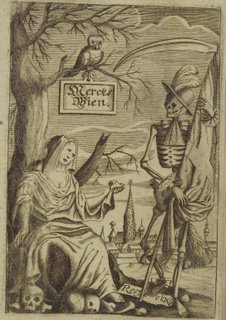
 Steven Blankaart
Steven BlankaartDie belägert- und entsetzte Venus.. 1689
[treatment of Syphilis: mercuric smoking and sweating depicted]
 Jean-Jacques Manget
Jean-Jacques MangetTraité De La Peste. 1721.
[Protective clothing for a physician treating someone
with plague. I've seen similar images all over the place
so I don't know which might be the original]
{We saw Manget's alchemy compendium the other week}
 David Herlitz
David HerlitzKurtze ... Erklerung 1607.
[an astrological paper concerned with the
natural and supernatural causes of plague]
 Heinrich Grasmüller
Heinrich GrasmüllerKrancken-Buch 1681.
[seems to be a moralist book both decrying
the sins that bring on plague and also provides prayers,
lectures and exercises for plague and disease victims]
 Abraham a S. Clara
Abraham a S. ClaraMercks Wienn 1680.
[A moral admonishment of the people of Vienna but
moreso it provides a history of the plague's toll on
that city. The many 'danse macabre' emblems
belong to the totentanz body of artworks from Vienna.]
Ok, that's a pretentious post title and I'm not about to go into the background of the 34 million deaths across 4 centuries caused by the tiny bacterium Yersinia pestis and its transmission vectors, fleas and rats. Bubonic plague is unquestionably one of the most significant influences in human history. One passing piece of not so trivial trivia: The Great Fire of London in 1666 was at least partly responsible for ending the plague epidemic by killing or driving off the rats.
Originally I had a folder of images from Brunschwig's famous Pestbuch and I bookmarked the thumbnail page. When I went searching for the introductory notes I found that the Herzog August Bibliothek Wolfenbüttel had a display of rare book images concerned with historical epidemics (click 'Übersicht' for thumbnail views).


No comments:
Post a Comment